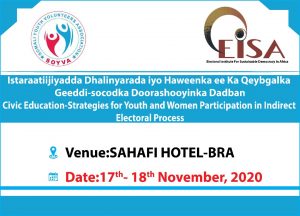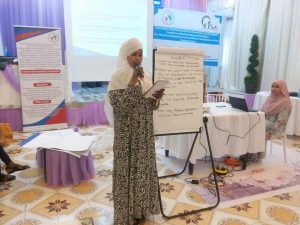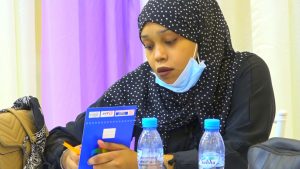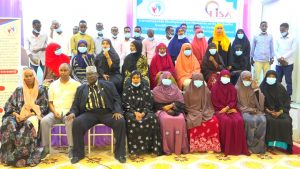Istaraatiijayadda Dhalinyaradda iyo Haweenka ee ka qeyb galka Geedi Socodka Doorishooyinka Dadban ee lafilaayo inay Dalka ay ka dhacdo 2020-2021 Soomaaliya.
Civic Education -strategies for youth and women’s participation in Indirect Electoral process 2020-2021 in Somalia.
Report:
INTRODUCTION
Somali Youth Volunteers Association (SOYVA NGO) with the technical support from the Electoral Institute for Sustainable Democracy in Africa (EISA) conducted two day Civic Education in Banadir Regional Administration(BRA) on 17th -18th Nov, 2020 in Mogadishu at Sahafi Hotel.
THESIS STATEMENT/TOPIC
Strategies for Youth and Women Participation in Indirect Electoral Process
Objective
- To scale up the Youth/Women/Girls participation in the upcoming elections
- To outline various political activities and opportunities available to the youth and women.
- To classify various participants views and perception of youth and women about their future political role.
- To discuss challenges undermining Somali’s transition to universal suffrage election and the future of electoral process in the country
RELEVANCY OF OUR ACTIVITY
- Youth and women are eagerly to actively involved in the politics because seven out of every ten Somalis are younger than 35 years
- We believe that most of the political decision made by the politicians affect the future lives of the young people.
- Youth are the asset of the country, so their involvement in politics is significant and can lead to more developments, prosperity and stability.
- Energetic young people will focus on political ideologies and manifesto as they have little knowledge of tribal politics. This will transform Somalia leading to healthy politics for tangible growth of country and enhance the level of progress leading to a peaceful and prosperous nation that lives in harmony.
- Youth and women are agent of change. Most of the recent uprisings and revolutions across the world are led by young people who are tired of retrogressive leaders.
- Identify strategies and networking for more youth and women participation in the upcoming elections
METHODOLOGIES
- Qualitative and quantitative approach
The research design employed is the qualitative approach. This is to analyze the future role of Somali youth and women in political participation and how different types of political activities bring certain level of political equality.
In developing our activity, we used a consuming theory to study and explain the research questions. The empirical research design of the study is qualitative oriented and data collected through semi-structural interview. Based on the observation and opinions contributed by the invited guests and participants, there is strong evidence to suggest that Somali youth and women had a particular interest in political participation. However, this interest was confined by space, disorganized youth and women, the influence of clan identity politics in Somalia and lack of enough civic education to disseminate the information as well the available opportunities for the young people.
During the two day activity, we collected data on the available strategies for young people through posing open questions and conducting group discussions.
This is to explore the ability of the participants to intelligibly articulate the strategies and opportunities available for Somali youth and women.
We also did theoretic analysis model with the objective to classify the views of various participants on political activities and analyze the perception about how youth and women understand their future political role and participation in association to the political activities such as voting, decision making, contacting officials and political campaigning etc.
.




